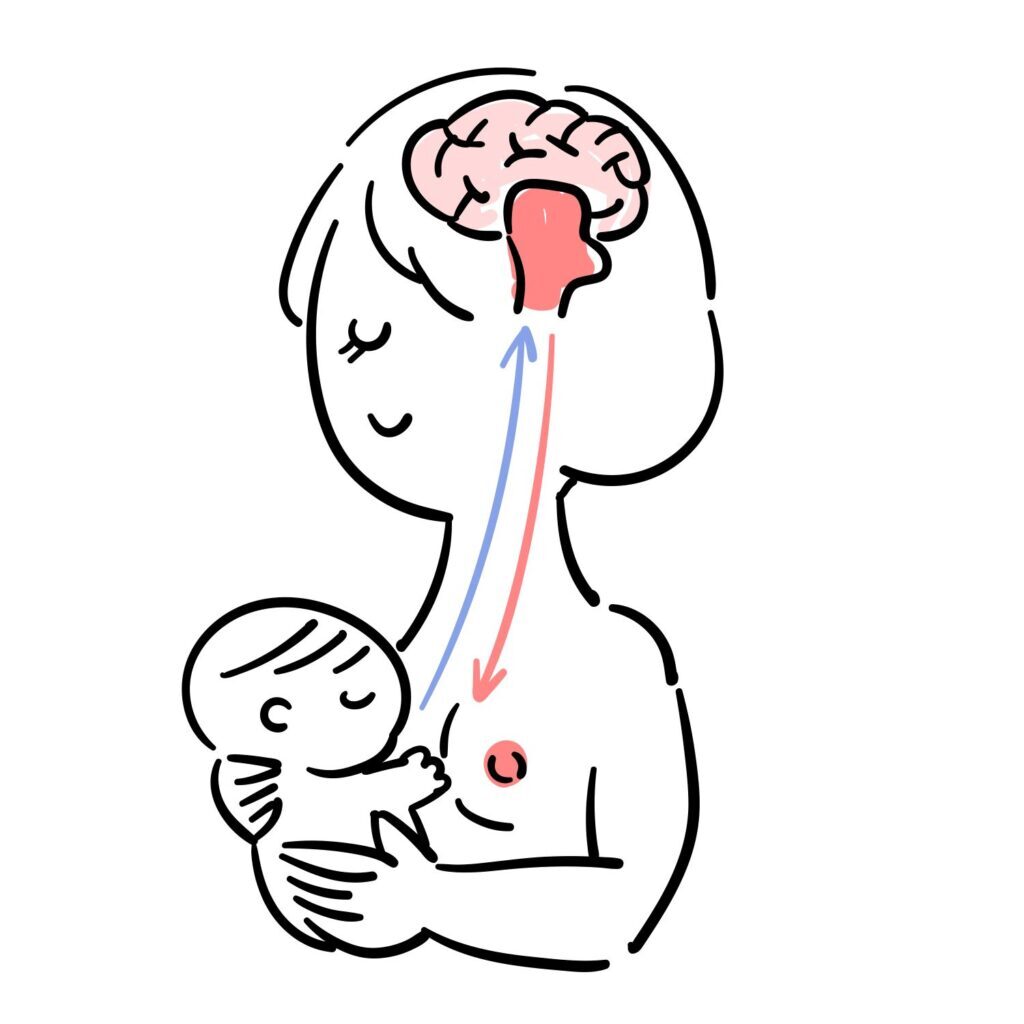Birthing|Integrative Health
The Science of Hormones in Labor and Postpartum

As hopeful, expectant, birthing and parenting people, all the uncertainty and unknown around conception, childbirth and the postpartum year can often feel overwhelming at times. To simplify some of the congestion, we can look to evidence based information to inform our choices. We can turn to findings from neurobiology and endocrinology, the study of our nervous system and hormones, to build our ‘better birth plan’.
The key hormones responsible for facilitating childbirth and postpartum recovery, lactation, and even influencing our parenting behaviors include oxytocin, prostaglandins, relaxin and endorphins. Here’s a window into what each of these neurotransmitters, how they function and practical ways to make them work to your advantage as a birthing person or new parent to naturally stimulate the production of them:
Oxytocin
Role in Labor
Oxytocin is referred to as the “love hormone”. It is crucial for initiating and sustaining labor. It stimulates uterine contractions, helping to dilate the cervix and bring the baby down and through. During labor, oxytocin is released in waves, increasing the strength and frequency of contractions. We want to build this up in the body!
Role in Postpartum
After childbirth, oxytocin continues to be important. It helps contract the uterus to prevent excess bleeding and aids in the delivery of the placenta. Many hospitals will offer to administer pitocin, a form of synthetic oxytocin, to support this process. Additionally, oxytocin promotes bonding between the mother and baby. It also stimulates milk ejection during breastfeeding.
Strategies for Production
- Physical Touch and Comfort – This can include skin to skin contact between parent and baby or parent to parent. Gentle massage and warm baths can increase oxytocin levels. Physical intimacy if comfortable – including a good makeout session or nipple/clitoral stimulation can also aid in building oxytocin levels in the body
- Positive Emotional Support – Being surrounded by supportive people, having a trusted birth partner, and having the guidance and reassurance of a doula, is known to impact outcomes. How can this be so important? Maintaining a calm, comfortable environment and buffering the inevitable stressors involved with birth and parenting, can boost oxytocin production
- Breastfeeding – Nursing your baby stimulates oxytocin release, promoting uterine contractions to reduce postpartum bleeding and aid in milk ejection
- Relaxation Techniques – Practices such as mindful deep breathing, meditation and visualization can help increase oxytocin by reducing stress and anxiety
Prostaglandins
Role in Labor
Prostaglandins are lipid compounds that have a hormone-like effect. They are involved in ripening (softening and thinning) of the cervix in preparing for the early stage of labor. They also enhance uterine contractions.
Role in Postpartum
They continue to support uterine contractions after delivery, helping the uterus return to its pre-pregnancy size and reduce postpartum bleeding.
Strategies for Production
- Diet – Consuming dates in the final weeks of pregnancy has been suggested to help ripen the cervix in some studies, potentially due to their prostaglandin-like effects
- Sexual Activity – Semen contains prostaglandins, and sexual intercourse also is a strategy some couples use to ripen the cervix and stimulate uterine contractions
Relaxin
Role in Labor
Relaxin is produced by the ovaries and placenta during pregnancy. It helps to relax the ligaments in the pelvis and soften and widen the cervix in preparation for childbirth. This increases the flexibility of the birth canal, facilitating labor and delivery.
Role in Postpartum
Postpartum, relaxin levels gradually decrease, which helps the body’s ligaments and joints return to their pre-pregnancy state.
Strategies for Production
- Gentle Exercise – Activities like prenatal yoga and walking can help keep the body flexible and prepare the pelvis for childbirth
- Proper Hydration and Nutrition – Maintaining good hydration and a balanced diet supports overall hormonal balance, including relaxin levels
Endorphins
Role in Labor
Endorphins are natural pain-relieving hormones produced by the body in response to stress and pain. During labor, high levels of endorphins can help manage the pain and stress of childbirth, creating a sense of well-being even as labor intensifies.
One approach to making pharmaceutical pain management decisions is to wait at least 30 minutes before making a decision or concluding that it’s more than you can handle. Generally endorphins kick in AFTER labor ramps up, and following the initial internal resistance we may feel to the new level of sensation.
Role in Postpartum
Postpartum, endorphins continue to help manage pain and promote a sense of well-being. They also play a role in the emotional bonding process between you and baby. Sometimes, however, because we have a high level of production in pregnancy and birth, it can feel as if our pain thresholds are diminished in the postpartum recovery period. Be kind to yourself and don’t hesitate to take steps to manage pain, including prescribed or over-the-counter pain medications suggested by your doctor or midwife.
Strategies for Production
- Physical Activity – Moderate exercise, such as walking or swimming, can boost endorphin levels
- Breathing Techniques – Practicing deep, rhythmic breathing can help increase endorphin production
- Laughter and Joy – Engaging in activities that bring joy and laughter can naturally increase endorphin levels (i.e put on your favorite comedy or try out some laughter yoga!)
- Warm Baths and Comfort Measures – Taking warm baths or using a warm compress can help relax muscles and promote endorphin release
What feels best and good to you in your body? That’s what our doulas want to know so that we can help facilitate a productive hormone-rich environment for a healthy, happy pregnancy, birth, baby and family during this special time! At Birthways we are here for you and the diverse needs of the families we serve, supporting comfort and ease. It is that simple.
If you want to get started today discussing what tailored support can look like for your needs, please schedule a free initial consultation with our team!



























